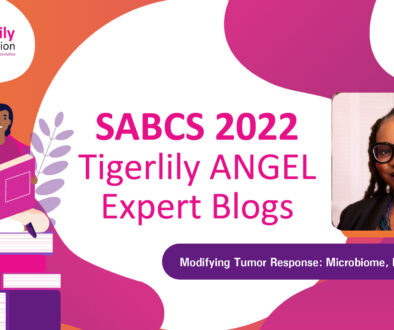A Closer Look at SABCS with Kawana Rucker, Tigerlily ANGEL Advocate
Throughout SABCS week, we’ll be sharing some ideas, reflections, and opinions of patient advocates who attended. Each evening, we’ll share a little about each Tigerlily ANGEL Advocate, their story, and why they decided to participate in SABCS 2021.
Kawana Rucker is a two-time Breast Cancer Conqueror, diagnosed in 2018 and again in 2019. Her diagnosis was Stage 1 Triple Positive Breast Cancer both times. She is a patient advocate and Board-Certified Wellness Coach. In addition to being a Tigerlily ANGEL Advocate, she is also on the Community Council Board at Glimmer of Hope Foundation. Kawana advocates for others and helps others advocate for themselves throughout their breast cancer journey.
One of the sessions Kawana attended was the SABCS Special Session: Trust in Science and Health Care. Co-Hosted by Maimah Karmo and Dr. Charles M. Perou, Speakers included Dr. Lori Wilson, Dr. Deborah Stroman, Dr. Eric Winer, Dr. Amelia Ramirez, Patient Advocate Ysabel Duron, and Dr. Olufunmilayo Olopade. We asked Kawana some questions about the special session she attended, her thoughts, and how her perspective was influenced.
Tigerlily Foundation: Kawana, why were you interested in participating in SABCS?
Kawana Rucker: I’m interested in learning about the new research, new studies and sharing my experience as a breast cancer patient and advocate. I’m looking forward to learning more about the CAM therapies that support breast cancer patients.
Tigerlily Foundation: What was the main subject matter and what were your takeaways?
Kawana Rucker: Health Equity. Breast cancer Care is not equitable across all health care. Structural racism must be addressed from the top in order to impact the patient. Fewer than 3 percent of oncologist are black. If all patients get the same treatments in clinical trials the outcomes are the same among races.
Trust in health care is built by the data collection, conversation and when patients are allowed to tell their story. Presenting Cancer teams to patients build trust. The greater the respect in the patient physician relationship, the greater the trust. It is important to Educate, Advocate and conduct research in a culturally relatable way.
Tigerlily Foundation: What was the background information on this topic?
Kawana Rucker: Despite the advances in cancer treatment, patients in the BIPOC community are still dying a greater number’s, more likely to have advanced cancers, less likely to be treated fairly, treated at later stages and adversely impacted racism in care. Less research and trials including women of color.
Tigerlily Foundation: What was new information or new things you learned about that you might want to research later?
Kawana Rucker:
- CDC Cancer training for breast cancer patients.
- Ways to educate and engage the BIPOC community about breast cancer within the community and make it culturally relatable.
- Triple negative breast cancer research genetic disposure Amount of money allocated to clinical trials for BIPOC.
Tigerlily Foundation: What are some questions that you feel like should be considered further pertaining to this subject?
Kawana Rucker:
- How often is breast cancer talked about in schools, homes, churches in the BIPOC communities?
- How can funding be allocated to BIPOC breast cancer patients to participate in clinical trials. This includes the drugs, housing, food etc. if they must travel to participate?
- How do we make breast cancer education, research, and advocacy relatable to the communities in which we serve?
Tigerlily Foundation: What part(s) of the continuum of care was/were addressed?
Kawana Rucker: Treatment, disease progression, treatment resistance, investments, funding, clinical trials, clinical trial availability.
Tigerlily Foundation: Were disparities discussed or addressed?
Kawana Rucker: Yes, Discussion on inequity in cancer care, research, participation in clinical trials.
Tigerlily Foundation: Was the presentation inclusive or represent voices/issues from patients of color? Young patients? Patients living with Metastatic Breast Cancer (MBC)?
Kawana Rucker: Yes, the panel consisted of Women of Color, non-white men, indigenous women, and a Black Physician living with MBC.
Tigerlily Foundation: Was your perspective influenced in any way after the session? If so, how?
Kawana Rucker: This session was phenomenal. It highlighted many of the disparities many of us face as BIPOC in the health care system and particularly the breast cancer community. This session has empowered me to think of more creative ways to insist breast cancer literacy is taught in schools. The more people know about cancer earlier in life the more knowledge they will have if someone they know is diagnosed with cancer. Also highlighted some areas that I can assist my breast cancer patients as a health coach.
________
This content is sponsored by our Partners at Seagen, Pfizer, and Puma Biotechnology.
Speakers for this SBACS Special Series Included: Lori L. Wilson, MD, Associate Dean of Diversity and Faculty Development, Howard University College of Medicine, Deborah Stroman PhD, UNC Health Equity and Social Justice, Lisa C. Richardson, MD, Director, Division of Cancer Prevention and Control, CDC, Olufunmilayo I. Olopade, MD, FACP, Director, University of Chicago, Daniel Calac, MD, Chief Medical Officer, Indian Health Council, Inc, George Sledge, Jr., MD, Professor of Medicine (Oncology), Stanford Cancer Center, Melissa B. Davis, PhD, Associated Professor in Surgery, Weill Cornell Medicine, Darcy Burbage, DNP, RN, AOCN, Na’Diah Smith, Patient Advocate, Aliya Whipple, Patient Advocate, Lauren Candies Tarpley, AYA Breast Cancer advocate, Published Author, Erica Stringer-Reasor, MD, Associate Professor of Medicine, Director Breast Cancer Program, University of Alabama – Birmingham, Eric P. Winer, MD, Chief, Division of Breast Oncology Center, Dana-Farber Cancer Institute, Amelie G. Ramirez, Dr.P.H., M.P.H., Chair, Department of Population Health Sciences, UT Health San Antonio, Elena Martinez, PhD, Professor UC San Diego Moores Cancer Center, Sophia George, PhD, Research Associate Professor, University of Miami Cancer Center, Thelma Brown, Patient Advocate, Ysabel Duron, Patient Advocate, and Ashley Dedmon, Patient Advocate.



